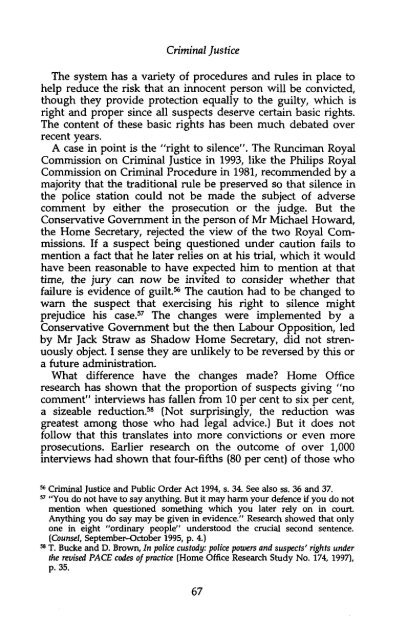HAMLYN - College of Social Sciences and International Studies ...
HAMLYN - College of Social Sciences and International Studies ...
HAMLYN - College of Social Sciences and International Studies ...
You also want an ePaper? Increase the reach of your titles
YUMPU automatically turns print PDFs into web optimized ePapers that Google loves.
Criminal Justice<br />
The system has a variety <strong>of</strong> procedures <strong>and</strong> rules in place to<br />
help reduce the risk that an innocent person will be convicted,<br />
though they provide protection equally to the guilty, which is<br />
right <strong>and</strong> proper since all suspects deserve certain basic rights.<br />
The content <strong>of</strong> these basic rights has been much debated over<br />
recent years.<br />
A case in point is the "right to silence". The Runciman Royal<br />
Commission on Criminal Justice in 1993, like the Philips Royal<br />
Commission on Criminal Procedure in 1981, recommended by a<br />
majority that the traditional rule be preserved so that silence in<br />
the police station could not be made the subject <strong>of</strong> adverse<br />
comment by either the prosecution or the judge. But the<br />
Conservative Government in the person <strong>of</strong> Mr Michael Howard,<br />
the Home Secretary, rejected the view <strong>of</strong> the two Royal Commissions.<br />
If a suspect being questioned under caution fails to<br />
mention a fact that he later relies on at his trial, which it would<br />
have been reasonable to have expected him to mention at that<br />
time, the jury can now be invited to consider whether that<br />
failure is evidence <strong>of</strong> guilt. 56 The caution had to be changed to<br />
warn the suspect that exercising his right to silence might<br />
prejudice his case. 57 The changes were implemented by a<br />
Conservative Government but the then Labour Opposition, led<br />
by Mr Jack Straw as Shadow Home Secretary, did not strenuously<br />
object. I sense they are unlikely to be reversed by this or<br />
a future administration.<br />
What difference have the changes made? Home Office<br />
research has shown that the proportion <strong>of</strong> suspects giving "no<br />
comment" interviews has fallen from 10 per cent to six per cent,<br />
a sizeable reduction. 58 (Not surprisingly, the reduction was<br />
greatest among those who had legal advice.) But it does not<br />
follow that this translates into more convictions or even more<br />
prosecutions. Earlier research on the outcome <strong>of</strong> over 1,000<br />
interviews had shown that four-fifths (80 per cent) <strong>of</strong> those who<br />
56 Criminal Justice <strong>and</strong> Public Order Act 1994, s. 34. See also ss. 36 <strong>and</strong> 37.<br />
57 "You do not have to say anything. But it may harm your defence if you do not<br />
mention when questioned something which you later rely on in court.<br />
Anything you do say may be given in evidence." Research showed that only<br />
one in eight "ordinary people" understood the crucial second sentence.<br />
[Counsel, September-October 1995, p. 4.)<br />
58 T. Bucke <strong>and</strong> D. Brown, In police custody: police potvers <strong>and</strong> suspects' rights under<br />
the revised PACE codes <strong>of</strong> practice (Home Office Research Study No. 174, 1997),<br />
p. 35.<br />
67

















